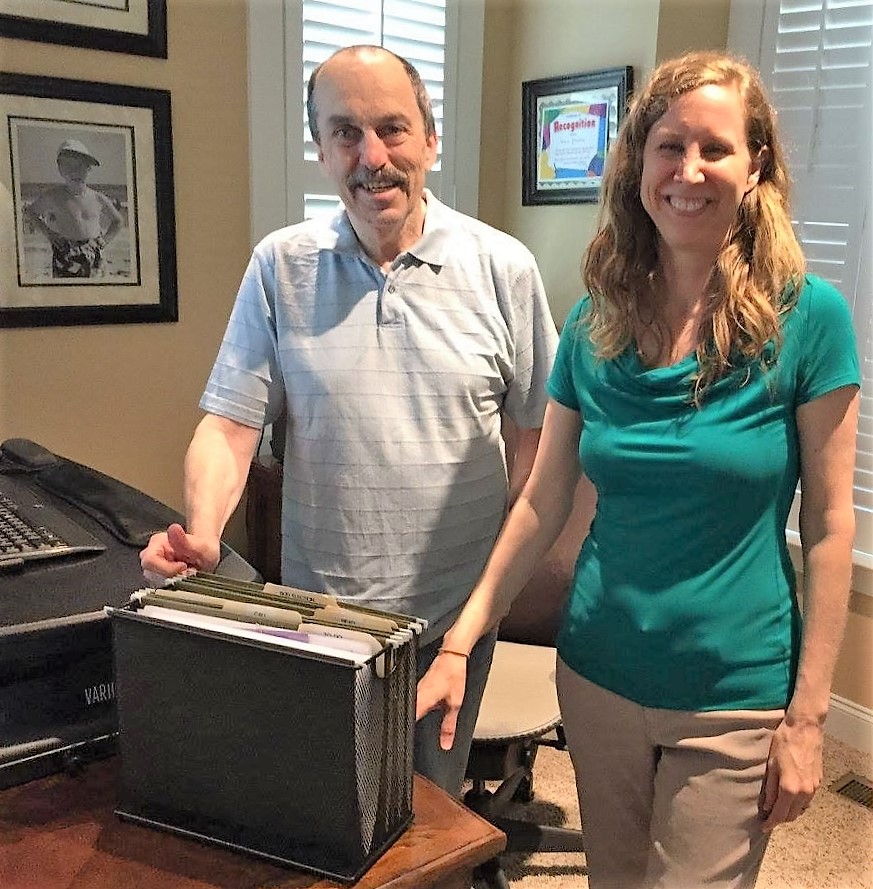Asheville-area professional organizers say that becoming more organized and having less clutter can improve overall health, relationships, productivity and energy levels. “Surrounding yourself with organized, calm and functional spaces can significantly improve your focus and well-being and can even make you live longer,” says Lauren Brown, owner of Ellesee Organizing of Waynesville.
“Disorganized spaces are associated with higher stress levels,” says Brown, citing a variety of studies. “There are [some] that show that people who live in disorganized spaces have higher levels of the stress hormone cortisol. Higher cortisol levels, when sustained over a long time, are linked with anxiety, depression, digestive issues, high blood pressures and a whole host of other medical problems,” she says.
Angie Mattson Stegall, owner of Your Organized Guide, Inc., helps business owners get organized. “When people call me, they are in pain,” she says. “They’re stressed out. They say, ‘My office is a wreck, my calendar is out of control, and in some ways, my life is out of control.’”
Stegall says many clients call her because they’re “working 24/7, 365 days a year and spend too much time looking for stuff. In essence, they need help to make some room.”
For some of her clients, downsizing can create more leisure time, says Stegall. One of them was setting up a new law office. Stegall helped her clarify what type of clients she wanted to work with and how much she wanted to work. Thanks to improved systems and a “decluttered calendar and client list,” the client was able to find time to take up a past hobby that she loved — riding horses, says Stegall. With more extra time, the client bought a horse and began to ride competitively, losing weight and healing her back problems in the process, says Stegall.
There’s no right way to become organized, says Sage Linden, owner of Life Optimized in Asheville. “I don’t believe everyone must have clutter-free space to be productive or happy or well,” she says with a laugh. “We all have different tolerances for how sparse or filled our spaces are. I personally lean toward the minimalist side, but all my organizing training has shown me that people have different ways for getting organized, depending on their personality and preferences.”
But research shows that most people benefit from having less clutter, says Linden. “There was one major study by Princeton University, [which] found that when your environment or mind is cluttered and it feels chaotic, you are not able to focus fully. From a neuroscience perspective, distractions affect your brain’s ability to focus or process information,” she says.
“So when we’re talking about physical clutter, it distracts you visually, and mind clutter affects you mentally.” An example of mental clutter, Linden adds, is keeping a list of tasks in one’s head instead of writing them down or keeping them in an electronic task-management system. “Less mind clutter means more space for creative thoughts,” she says.
Some people can become “addicted to things, addicted to clutter in a way,” says Robert Uherka, owner of Simply Change Now. “They find safety in belongings and sometimes forget that their true value is themselves.”

Uherka exudes empathy when he talks about the people who call him, so it’s not surprising his clients open up to him about the health challenges accompanying their organizational issues. People have “everything from headaches to body pains, lack of sleep, lethargy, appetite changes and mood swings,” he says. “Mood swings is a big one. It’s kind of like, what came first — the chicken or the egg. Was it the mood swing that caused the house to become more and more disorganized, or was it the disorganization that created mood swings?” He says it can go both ways.
Clutter is related to health problems, Uherka notes, because “everything we own has an energy to it. It either gives us something or sucks from us.”
He tells the story of a client in her early 70s whose problems began after a monthslong illness. “She just got overwhelmed with her home. There were too many bills and paperwork coming in. … It just got to be too much,” says Uherka. “Her house got really cluttered really fast, and she maintained it like that for a few years; she just didn’t have energy to put it back together. She lived in this depressing space, which caused her to be depressed, and which also caused her to not fully heal from an injury from two years previous,” he says.
Uherka worked with her to restore her house to its previous condition and put systems in place to maintain it. After that, she had a full recovery. “She was even on medication for depression at the time, but she was able to come off of antidepressants and live a very healthy, full life,” he says.
“Oftentimes that is what I see happen. [Disorganization] just starts to spiral. Then it affects every area of your life, including relationships and the way you treat yourself,” says Uherka.
Some people keep things out of guilt, he continues. That was the case with another client who had so much stuff it was impossible to walk through her house, a condition known as hoarding. She had inherited a lot of her mother’s belongings and felt too guilty to get rid of them, says Uherka.
The client became so depressed that she often didn’t change clothes or bathe, he says. Over the course of three months, Uherka estimates, she removed 60 percent of the items in her home with his help. “The last time I stopped by, the house looked great. She had a big smile on her face, she was active with neighbors, going out more frequently, her health was way better, and she was participating in life again,” he says.
What is the best way to get organized? People can easily get overwhelmed “looking at piles of things,” says Brown. “My advice is to start imperfectly and allow yourself to begin without knowing how far you’re going to get or what the end point will look like.”
Uherka suggests one step a day. “If you did that, that would be 365 steps in a year that you took to be more organized in your life — one drawer in the kitchen, one cupboard, one sock drawer, let go of one thing,” he says.
A problem with the busy lifestyle so many people lead these days, Uherka maintains, is that “when our space isn’t organized, it creates more of a chaotic mind. What I find is that most people’s minds are really racing. A calm, organized space will help support a calm, organized mind.”
More Info
Angie Mattson Stegall
angiestegall.com
Lauren Brown
elleseeorganizing.com
Sage Linden
life-optimized.com
Robert Uherka
simplychangenow.net




Before you comment
The comments section is here to provide a platform for civil dialogue on the issues we face together as a local community. Xpress is committed to offering this platform for all voices, but when the tone of the discussion gets nasty or strays off topic, we believe many people choose not to participate. Xpress editors are determined to moderate comments to ensure a constructive interchange is maintained. All comments judged not to be in keeping with the spirit of civil discourse will be removed and repeat violators will be banned. See here for our terms of service. Thank you for being part of this effort to promote respectful discussion.